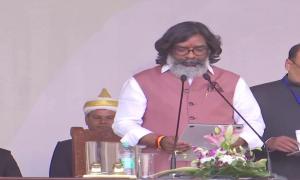
Do all Americans believe India is a land of snake charmers and fakirs? Certainly, 31 students from the Massachusetts Institute of Technology's Sloan School of Management have had their eyes opened to modern India in a very dramatic way.
For 10 days, the students who are studying for management degrees at Sloan travelled from Bangalore to Delhi, Mumbai and Agra. They threw in spots of tourism with an educative tour of corporate India's finest including Wipro, Motorola, General Electric, ICICI Bank, MphasiS and Godrej Industries.
Their tour covered modern India at its cutting-edge best, from pharmaceuticals to infotech, business process outsourcing and financial services.
Why are American students taking time off to visit India? Actually, it isn't time off at all. The 31 students have signed on for a course on the fast-growing trend of outsourcing.
"We organised it based on strong demand from the students," says India-born professor Amar Gupta, who teaches the course jointly with Sloan's former dean Lester Thurow.
Sloan isn't the only prestigious American university where outsourcing -- and, of course, India -- is now on the syllabus. In recent years, almost all the major American business schools, from Kellogg to Stern, Tuck, Cornell, Berkeley, Stanford and Harvard have put outsourcing and India on their teaching itinerary.
These courses give students a chance to have a behind-the-scenes peek into how companies work in a country like India. And suddenly, these courses that once attracted only a handful of students -- some of them Indians -- have become extremely popular and even fashionable.
Take a look at how times have changed at Wharton. Two years ago, when Ravi Aron, assistant professor of operations and information management at the Wharton School, University of Pennsylvania, introduced a course of offshoring of services, less than 10 students registered. Today, more than 100 have taken it as an elective.
In January, Bentley College, Waltham made its inaugural journey to India for overseas studies. This was after one of its faculty members, St Stephens and Delhi University-educated Donald R Chand, introduced a course on offshoring.
Chand put the course together after a whistle stop 22-day round trip to India last year to survey IT hubs in Gurgaon, Bangalore, Chennai, Hyderabad and Mumbai. Then, Chand and colleague Sri Vasudevan designed a graduate-level elective course for MBA and Master of Science students.
Says Joseph de Foleschampe, 34, an MS student in corporate finance at Bentley who made the India trip: "My personal interest was to understand what challenges a CFO, venture capitalist or entrepreneur might have in undertaking a project. It was important to see the infrastructure, culture and day-to-day life, so I could personally form objective conclusions about the trends, challenges and risks."
According to Foleschampe, when the trip, open to all Bentley's graduate students, was announced in autumn 2003, many had to be turned away due to limited space.
Chand, says that of the 44 students interested, only 10 were enrolled but he hopes to take on more this year. "The objective is to provide students an opportunity to formally study this new phenomenon of offshore outsourcing and its role in the globalisation strategy of US firms," he adds.
What are the management students hoping to learn about? Top of the agenda is, of course, outsourcing. But they also want to take a look at the country that has suddenly turned around from being a PL 480 basket case to the Oriental land that is stealing American jobs.
The other hot destination is obviously China and some students frequently want to visit both countries. Says Sloan's Gupta: "The MBA students have been very persistent in their requests for more exposure to emerging economies, especially India."
How will a visit to India or China help these students? Back in the late '80s and early '90s as American multinationals began earning more money from their foreign subsidiaries, it became mandatory for almost every highflying executive to have at least one posting abroad.
Now, youngsters who are barely starting their career realise they must understand how things work outside the United States. And outsourcing particularly is taking place in almost every industry.
The newfound interest in India sometimes surfaces even if there aren't any official courses -- though it's usually helped along by energetic non-resident Indians. That's what is happening at Harvard Business School where Chennai-born Kapil Viswanathan has set up a Global Outsourcing Club, dedicated to studying the field.
Viswanathan, who holds a Masters in industrial engineering from Stanford, is masterminding the club's maiden two-week India pilgrimage soon after Christmas this year.
"Increasingly, Harvard Business School students are realising that the probability of doing business with India at some point in their career is 100 per cent. They are also realising that outsourcing is fast becoming a strategic imperative for corporations to compete successfully," he says.
And the response? The list of 200 enthusiasts will be whittled down to 75, says Viswanathan, who once led the global sales and marketing for Tata Consultancy Services' retail practice from Chennai. He is currently negotiating with top business houses in India to set up networking receptions for his batchmates.
Don't think that India is the only country on the syllabus at American universities. But interest in India has picked up in recent years and it has really been kindled by the great outsourcing debate.
Universities like Dartmouth's Tuck School of Business and New York University's Stern School of Business cover India under what they term 'overseas exposure opportunities'.
At Stern students have travelled both to India and China. Says Dean Thomas F Cooley: "The goal is not specifically focused on outsourcing but rather to examine the range of developments in these economies." Adds Sreenivas Kamma, professor at Indiana University's Kelley School of Business: "Adding India to the mix alters the menu of choices open to a company."
Wharton's Ravi Aron reckons that many of the schools are responding to clamour from students for material on offshoring and outsourcing. "This is not unlike the e-commerce wave, where there was first business activity, then media frenzy and then a stampede by B-Schools to launch courses with off-the-shelf material," he says.
The media frenzy is, of course, fed by reports from organisations like Forrester Research, a leading American emerging-technology research firm which has made oft-repeated predictions that by 2015 about 3.3 million white-collar jobs will be shunted from the US to countries like India.
So the smartest youngsters have figured that if you can't beat them you might as well learn about them. Says Indiana University's Kamma: "It is the realisation that 'you ignore India only at your peril', as it is not simply a trading partner but an essential plank in companies' global competitive strategies."
What do the students learn on such courses? These courses, like every other elective in an American university, are a mixture of lectures and term papers. Gupta has often had the US representatives of companies like Infosys, Wipro and ICICI Bank making presentations in class.
Then, there's the visit to India and top destinations include places like Wipro Spectramind's Delhi office. On the agenda are a series of high-level meetings, including with Wipro boss Azim Premji on what makes the call centre tick. Then, there's a walkathon to see how employees work.
"It makes the India experience realistic as many of the students have seen India on the Net, as a land of fakirs and rope tricks. This makes them aware of career options in a global economy," says Nilanjana Paul, vice president, new product development at Spectramind.
At a slightly different level, Sloan visited Bangalore-based Toyota Kirloskar Motor where they were hosted by chairman and MIT alumnus, Vikram Kirloskar. Says Kirloskar: "They wanted to know what Toyota was doing in India and how were partnerships formed and how do they work."
The students themselves seem impressed by what they've seen. Berkeley's Sean Downey, 29, made his maiden India trip in January. Downey has worked for seven years in financial services.
But he believes the trip to Infosys was invaluable: "They not only talked about all the benefits of outsourcing and the extremely talented workforce but also about some of the pitfalls of the relationships and the shortcomings of the workforce. It was a very balanced view," he says.
On his return, like most students, Downey wrote a paper on the infrastructure challenges India has faced since independence, what is being done domestically, and what multinational companies must do to handle the challenges.
Says Sloan's Gupta: "I believe all MBA students need to be exposed to these emerging business realities in order to become effective global managers. By visiting India, the students are able to recalibrate their opinions in India."
Berkeley's Chand adds: "As organisations learn to successfully globally distribute service-oriented work, structural change will take place in the economies and work opportunities all over the world. Offshore sourcing of IT services to India is one manifestation of this structural change."
The Americans have often been accused of being a vast and insular nation with no understanding of the outside world. Could that be changing? As globalisation becomes an unstoppable movement from Berkeley to Bangalore, that is probably the message that these American youngsters are sending out to the world.
Bharat Darshan for Americans
For Joseph de Foleschampe, an MS student of Bentley College, the high point of his trip to India was meeting Infosys chairman and chief mentor N R Narayana Murthy in Bangalore. No, not because Murthy bought them lunch at Domino's but because of his approach.
"He seemed genuinely concerned with our contextual understanding of business issues rather than just how outsourcing to Infosys could help US firms," he says.
This was just one of the stops. What is the travel plan for the American B-school students who turn up to study about outsourcing and India?
Inevitably, it involves a lot of visits to infotech campuses and BPO offices like Infosys and Wipro-Spectramind. Also, a spot of cultural tourism is a must and the Taj Mahal is almost always on the itinerary. So for any delegation, the normal trail involves Bangalore, Hyderabad, Mumbai, Delhi and Agra.
Take the two-week trip that 10 Bentley students made in January this year. Unlike other colleges, this batch spent most of its time in Bangalore. They visited companies like Wipro, Infosys, the MphasiS subsidiary Mysource, GE Capital and STPI.
In between, there were lectures organised by the faculty of IIM Bangalore, on subjects as varied as, 'A case study in relocating work, comparison: China and India's software industry and impact of the global demand and shifting policies'.
Apart from formal presentations, there are informal meetings with the likes of Narayana Murthy, Wipro chairman Azim Premji and MphasiS chairman &CEO Jerry Rao, Vikram Kirloskar, chairman Toyota Kirloskar and Adi Godrej, chairman Godrej group.
There are also stopovers at government offices. For some schools the director of the Karnataka state's IT department has held forth on facts about the state, IT government policies, infrastructure and industry trends.
"Meeting Infosys' Murthy was a high point. He seemed genuinely concerned with our contextual understanding of business issues rather than just how outsourcing to Infosys could help US firms," says de Foleschampe.
At times, there are visits to non-profit organisations like the Society for Participatory Research in Asia (PRIA) in Delhi. "The students are surprised to see that India lives in several centuries simultaneously -- from missiles to bullock carts to technology. They see a large part of India which isn't shining and that's a sobering effect," says PRIA, director Rajesh Tandon.
The Sloan School of Management students who wrapped up their trip in Delhi had breakfast with the President Abdul Kalam. They also met and were mighty impressed with Arun Shourie, the Union divestment minister. "One of the students said that this was the most rewarding experience in his entire stay in India," says Sloan's Amar Gupta.








More from rediff